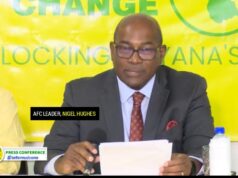Main Highlights
➢ There has been a consistent pattern of behavior on the part of Venezuela in relation to its claims over Essequibo and their recent aggravation over the last eight years, suggesting that it is largely motivated by the discovery of crude oil offshore Guyana.
➢ Venezuelan President, Nicolas Maduro’s recent statements and threats revealed the obvious―that is, he wants Guyana to become a failed State like Venezuela by committing the very mistakes Venezuela made that landed them in their current social and economic crisis.
➢ Guyana’s geopolitical security and by extension the region’s security hinges upon the strong tangible support from the international community, chiefly the United States.
➢ Should Guyana decide to pursue a similar path as Maduro is hoping for, Guyana will most certainly become a failed State, at which point the country will become more vulnerable to military invasion on the part of Venezuela, if it so wishes to seize two-thirds of Guyana’s territory. Because in this scenario, the threat of the U. S’s military protection over Guyana’s territorial and sovereign integrity will no longer be an impediment for Venezuela.
➢ It is therefore in Guyana’s national security interest, considering the geopolitical risks, to foster, deepen, manage, and maintain good economic relations with all of its allies, particularly the U.S. However, this does not mean that Guyana must subject itself to disadvantageous imperialistic exploitation―as is the view by some proponents―rather, this is arguably not the case.
Introduction
The border dispute between the Co-operative Republic of Guyana and the Bolivarian Republic of Venezuela is a long-standing historic controversy. Its origin is within the framework of the validity of the “full and final” Arbitral Award of 1899.
In 1931, a boundary commission made up of representatives from Great Britain, Venezuela, and Brazil agreed on the specific point on Mount Roraima where the boundaries of British Guiana, Venezuela, and Brazil met. A concrete marker was erected soon after and the matter was permanently settled. Venezuela’s Minister of Foreign Affairs, Esteban Gil Borges in 1941 agreed that the frontier with British Guiana was well defined and was a closed issue. However, in 1962, Venezuela unilaterally and without any basis or evidence, announced that it regarded the Award of 1899 as null and void.
The United Nations Secretary-General conducted good offices from 1990-2017 to find a solution to this border controversy. In 2018, following careful analysis of the developments 2017, the United Nations chose the International Court of Justice (ICJ) as the means to be used for the solution of the controversy. Following this decision, Guyana filed an application instituting proceedings against Venezuela with the International Court of Justice on March 29, 2018.
This article seeks to analyze the current situation within the framework of the geopolitical matrix of the region, and how Guyana is seeking to mitigate the risks through its foreign policy and international relations.
Discussion and Analysis
Sequence of Events: May 2015 – September 2023.
There has been a consistent pattern of behavior on the part of Venezuela in relation to its claims over Essequibo and recent aggravation over the last eight years, suggesting that it is largely motivated by the discovery of crude oil offshore Guyana.
To this end, ExxonMobil, a U.S multinational oil company, discovered oil in commercial quantities offshore Guyana in May 2015. Almost immediately after the announcement, Venezuelan President, Nicolas Maduro in May 2015 issued a decree, No. 1787 laying an illegal claim to almost all of Guyana’s maritime zone. In July 2015, Venezuela issued a second decree, 1859 reiterating its claim. By September that same year, there was an escalation of Venezuelan military activity in eastern Venezuela near the border with Guyana.
Noteworthily, the foregoing occurred at a time when Venezuela was in the midst of an unprecedented social and humanitarian crisis―the result of bad economic policies and political conflict―that has led to food insecurity, the second largest migration crisis in the world, and regional instability. Shortly after the “No-Confidence Motion” (NCM) was passed in the National Assembly in December 2018, the Foreign Affairs Minister at the time had reported that the Venezuelans had attempted to land a helicopter on ExxonMobil’s ship.
Recently, as Guyana concluded the bid-round for new oil blocks offshore, Venezuela complained of Guyana’s intention to put up for bid certain oil blocks in the waters adjacent to its coast and concluded with a threat to “apply all the necessary measures” to prevent operations licensed by Guyana in these waters, which Venezuela claims as its own.
The Guyana Government responded to Venezuela urging to pursue peaceful means to address the concerns it might have. In another statement, His Excellency, Dr. Mohamed Irfaan Ali, President of the Co-operative Republic of Guyana assured that Guyana is united on the border dispute between the two countries, noting that he briefed the Opposition Leader, who reaffirmed his support to the Government of Guyana on the matter.
Venezuela was subsequently strongly condemned by the international community including by the OAS, CARICOM, and the Commonwealth.
Following this, Venezuela’s President, Nicolas Maduro responded to Guyana’s President Ali’s statement, accusing the Guyanese President of “lies and trying to hide the historical truth that weighs on the dispute over Essequibo territory…irresponsibility, manipulation, double talk, hypocrisy”. Maduro went onto accuse Guyana of going out of the way to please powerful transnational interests, referring to ExxonMobil. In his concluding statement, Maduro called on President Ali to “…not allow ExxonMobil to lead Guyana to the escalation of a conflict. Do not allow the Southern Command to turn your country into a military base against Bolivar’s Venezuela”.
In another statement from Maduro on September 26th, 2023, he reiterated that there is only one way to resolve the conflict over the territory of Essequibo: to return to face-to-face dialogue within the framework of the Geneva Agreement. This time, Maduro’s tone decelerated from aggression to the use of friendlier language, where he went on to state that the people of Guyana are Venezuela’s brothers and sisters and that they will never represent a threat.
It is worth noting that Nicolas Maduro is a strong anti-American especially against the U.S multinational corporation, ExxonMobil. There is a background story to corroborate this view.
Over the past two decades, Venezuela has changed to become a problematic country from an investment perspective. Venezuela’s political and economic history supports the assertion that Venezuela has and continues to be a risky place to make investments, especially for political reasons.
During the mid-1990s, Venezuela’s national oil company, PDVSA, implemented a policy known as the Apertura Petrolera (oil opening), which sought to mobilize the capital, technology, and managerial capabilities of international oil companies in order to maximize the production of crude oil while simultaneously reducing drastically the fiscal burden on hydrocarbons exploration and production activities. Of note, the policy achieved its objectives to a large extent.
Production by Venezuela was a key factor behind the oil price collapse of 1998, and the paltry fiscal income generated by some of the Apertura era projects made them the most unfavorable–for the State–in the history of Venezuela’s petroleum industry. The standard bearers of the Apertura were four large, costly, and complex projects dedicated to the production upgrading (i.e., partial refining) and marketing (as synthetic crude) of extra-heavy oils. Three of these projects were at the centre of arbitration proceedings that ConocoPhillips (COP) and ExxonMobil (XOM) initiated against Venezuela at the International Center for Settlement of Investment Disputes (ICSID) in late 2007.
These arbitrations featured some of the largest claims ever to have been made against a State by international investors: US$30 billion in the case of COP and more than US$15 billion in the case of XOM. COP and XOM alleged that, in changing the fiscal conditions for the upgrading projects, and then re-structuring them along the lines sketched above, the Venezuelan Government rode roughshod over their vested rights, treating contractual undertakings “as the proverbial scrap of paper” that they can disregard at their convenience…breaking all the commitments…made to induce investment.
In other words, XOM and COP contended that Venezuela, inter alia, legislative amendments enacted changes to the fiscal terms of the investment agreement that were more favorable to the country which jeopardized the stability of and security of their long-term investments.
According to XOM and COP, their legal proceedings were prompted by a commitment to uphold the principle of sanctity of contract. The oil companies would have bargained with PDVSA to obtain protection for their investments through specific compensation mechanisms, which made explicit reference to a limitation of liability on the part of PDVSA, and provided that foreign investors would be deemed not to have suffered any adverse economic consequences from government measures when the price of crude oil exceeded a certain threshold level.
In 2007, an arbitration panel awarded ExxonMobil $908 million in compensation for Venezuela’s nationalization of its assets, less than 10% of what the company sought in the long legal battle against Venezuela. In 2017, a World Bank tribunal eventually ordered Venezuela to pay ExxonMobil $1.4 billion in damages. In view of the less than 10% in compensation ExxonMobil sought, this meant that ExxonMobil effectively lost the legal battle against the Venezuela nationalization case.
One news report carried in one of the local newspapers, namely, the Kaieteur News on December 22, 2019, cited a report by Globovision which stated that Venezuela’s politicians are of the opinion that ExxonMobil is behind all the heavily imposed sanctions on the country by the United States. This view is not an improbable hypothesis considering the geopolitics of oil, and it is a view that is also held by other experts.
What are the lessons for Guyana?
This situation as described above in the case of ExxonMobil versus Venezuela, is precisely the origin of the stability clause that found its way into the Guyana PSA of 2016. In this regard, the stability clause states that any changes instituted by the Government through legislative amendments that would significantly alter the fiscal terms of the PSA, and that would result in a negative impact on the oil companies’ take, the Government will be obligated to compensate the oil companies for any such losses. It is for this reason that ExxonMobil is unlikely to agree to any renegotiation at this time.
As such, any strong legal or otherwise imposition by Guyana to change the fiscal terms of the 2016 PSA that would adversely affect the oil company’s take would not augur well for Guyana. In this regard, this would not only be a breach of the terms of the contract and jeopardizing the sanctity of contract principles–thereby increasing the level of perceived political risk of the country, but could also highly likely trigger geopolitical tensions on the part of Guyana by the U.S.
In any event, this would be an undesirable outcome for Guyana and the region at large. More so, given Guyana’ s strategic regional and geopolitical importance, Guyana needs to, now more than ever, ensure that it deepen its relations with the U.S and other allies for its stability and regional security–especially against the backdrop of the ongoing border controversy between Venezuela and Guyana. The general thrust of this notion is premised on the objective of achieving overall prosperity for the country and its people, which can only be achieved in a stable political, geopolitical, and economic environment.
On the other hand, instability in these respects, as is evidenced in the case of Venezuela and many other examples around the world, usually lead to the opposite–that is, political, social, and economic crises that culminate in economic devastation, thus, engendering widespread poverty.
With the foregoing in mind, this discussion and analysis would be rendered incomplete without highlighting the fact that there is a particular group of Guyanese who subscribe to the same anti-American/ExxonMobil position, consistent with Nicolas Maduro / Venezuela (Glenn Lall et.al). This group of individuals attack ExxonMobil on a daily basis and accuses the incumbent government of subjecting itself to undue exploitation by ExxonMobil and the U.S., which is arguably not the case and can be easily disproved. For example, the Government of Guyana has managed to successfully implement the Local Content Legislation and the Gas-to-Energy (GTE) Project, two major developments that ExxonMobil Guyana was not very keen at the outset to favorably support.
ExxonMobil wanted the Local Content Policy to remain in a policy form and not move to legislation. With respect to the GTE, they were trying to convince the government against monetizing the natural gas, on the basis that it would be best to reinject it into the wells to optimize production. These two developments alone would enable Guyana to optimize the in-country value from cost-oil by another US$2 billion annually. This sum is in addition to the government’s take that flows directly to the Natural Resource Fund/National Treasury (profit oil and royalty) and is poised to increase over the years relative to the level of increased production―as the country seeks to continuously build up local capacity and capabilities, and the oil and gas value chain.
Additionally, the government has improved the legal and regulatory framework, viz-a-viz, applying more stringent terms and conditions to environmental permits, introduction of a new Petroleum Activities, thus repealing the old Act, and a new model Production Sharing Agreement (PSA) with additional fiscal terms and conditions that will significantly increase the government’s take. These new terms and conditions will apply to future PSAs. Notably, ExxonMobil has participated in the bid round for the new oil blocks.
Concluding Remarks
Venezuelan President, Nicolas Maduro’s recent statements and threats revealed the obvious―that is, he wants Guyana to become a failed State like Venezuela by becoming anti-American and treat ExxonMobil in a similar manner that Venezuela did in the past.
Guyana’s geopolitical security and by extension the region’s security hinges upon the strong support of the international community, chiefly the United States. Should Guyana decide to pursue a similar path as Maduro is hoping for, Guyana will most certainly become a failed State, at which point the country will become more vulnerable to military invasion on the part of Venezuela, if it so wishes to seize two-thirds of the Guyana’s territory. Because in this scenario, the threat of the U. S’s military protection over Guyana’s territorial and sovereign integrity will no longer be an impediment for Venezuela.
It is therefore in Guyana’s national security interest, considering the geopolitical risks, to foster, deepen, manage, and maintain good economic relations with all of its allies, particularly the U.S. Notwithstanding, this does not mean that Guyana must subject itself to disadvantageous imperialistic exploitation―as is the view by some proponents―rather, this is arguably not the case.
About the Author
Joel Bhagwandin, MSc., is the Director of Financial Advisory, Market Intelligence, and Analytics at SphereX Professional Services Inc. He can be reached at [email protected].













